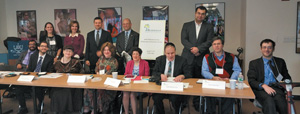
What if Moses decided not to lead the Jews out of Egypt because of his speech impediment? Award-winning author Chava Willig Levy, a polio survivor, uses that example to illustrate what she calls a clear biblical precedent that shows that people with disabilities have enormous potential to impact society.
“When God said to Moses, ‘I’m tapping you to lead my people out of Egypt,’ Moses [countered], ‘No, you’ve got the wrong guy. I’m disabled,’” Levy tells JNS.org. But God gets angry at Moses for doubting himself, and asks, “Who do you think gave you that mouth?”
Levy’s anecdote frames an ongoing discussion on the inclusion of people with disabilities. “There is Judaism, and then there are Jews,” she says, reflecting on the dissonance between the religion’s principles of universal inclusion and what Jewish society actually looks like.
Levy was among the attendees at the recent Ruderman Family Foundation’s first conference for self-advocating Jews with disabilities. The event brought together distinguished lawyers, rabbis, writers, teachers, and community activists whose successful careers, undaunted energy, and full lives counter longstanding misconceptions about people with disabilities.
The conference was “an important step for our community in understanding how we can become a more just, inclusive, and welcoming society for everyone,” said Jay Ruderman, president of the Ruderman Family Foundation. Ruderman, whose Boston-based foundation is dedicated to increasing such awareness, believes that seeking out “the advice of those people with disabilities who have been impacted the most by being excluded from our Jewish community” provides the best way forward.
Levy chronicles her journey in her popular memoir, A Life Not with Standing. Paralyzed at age 3, she recalls a happy childhood despite her frequent visits to the hospital, her inability to attend school until age 9, and the many other limitations on her livelihood. “Having a disability is not tragic,” she tells JNS.org. “What is tragic is the stigma.” (also see JLBC feature: http://alturl.com/mzh6z)
Levy sees language as the primary obstacle to inclusion. Individuals, she said, need to feel comfortable asking questions about people with disabilities. In her interactive workshop–called “Mommy, What’s Wrong with That Woman?”–Levy confronts the embarrassment parents commonly feel about answering their child’s natural questions whenever they observe people with disabilities. Likewise, she suggests that communities should be wary of imposing “definitional labels”–terms that clinically diagnose and are dismissive.
“Using the verb ‘to be’ is like placing an ‘equal’ sign on a person’s character, superficially categorizing their appearance or expression,” she said. Levy recommends “functional labeling,” which redirects people’s focus to the ways in which a person adapts and compensates for his or her disability, encouraging positive dialogue and perceptions.
Conference attendee Joseph D. Robbins, a celebrated poet and educator, works to improve institutional access to resources for people with disabilities. Robbins has dysgraphia, and without the benefit of computers and touch screens, he experiences extreme difficulty expressing his thoughts through writing.
“Everyone with a disability has his or her horror story,” Robbins says, recalling “old school” teachers who failed to understand his condition and impossible homework assignments that brought him to tears. Nonetheless, Robbins maintains that his early education was largely a positive experience. Throughout primary and secondary school, he received a warm welcome from teachers and peers, and he says the prevailing attitude of the school board handling his case was, “We’ll do anything.”
Yet Robbins notes that open-mindedness alone is insufficient support for people with disabilities. “You need the goodness of the heart and a plan of action,” he says. The poet references his senior year in college as a turning point, when he felt he had amassed enough tools and strategies to compensate for his disability, if not to draw strength from it. He got there thanks to a regimented program employing specialists who worked with him directly, twice a week. As a result, he eventually completed graduate school independently.
Robbins’s take-home message is that every educational institution can provide a high level of care through structured programming that maximizes the learning potential of any student with disabilities. But the challenge facing institutions, he says, lies in making advanced resources available. That is why the Union for Reform Judaism and the Ruderman Family Foundation are developing DisabilitiesInclusion.org, an online platform designed to provide instructional videos on practical skills, disability care and awareness, and educational programming. The primary goal of the program is to make all synagogue communities in North America more inclusive.
By Jeffrey Barken / JNS.org U.S..













